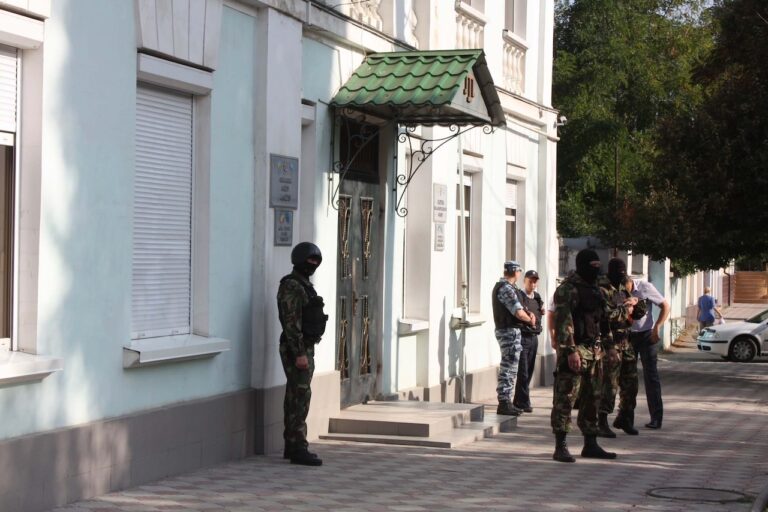In early August 1996, Eduard Khusnutdinov, editor-in-chief of “Vecherny Neftekamsk”, a newspaper formerly published in Bashkortostan, a constituent republic of the Russian Federation, was notified by a local prosecutor that he could face up to five years of imprisonment for libel of President Murtaza Rakhimov, leader of the autonomous region in the Urals. The independent […]
In early August 1996, Eduard Khusnutdinov, editor-in-chief of
“Vecherny Neftekamsk”, a newspaper formerly published in
Bashkortostan, a constituent republic of the Russian Federation,
was notified by a local prosecutor that he could face up to five
years of imprisonment for libel of President Murtaza Rakhimov,
leader of the autonomous region in the Urals. The independent
newspaper with a circulation of 10,000 was based in Neftekamsk, an
oil town with a population of 100,000 located about 125 miles
north of Ufa, the capital of Bashkortostan. “Vecherny Neftekamsk”
was one of the few private newspapers in a region where the media
has been heavily controlled by local leaders.
According to colleagues in Ufa and Moscow, the charges stem from
an article entitled “No Smoke Without Fire,” which contained an
allegation of bribe-taking and was published in a June issue of
the paper distributed before the 3 July national election run-off.
In the front-page key, a summary of the article contained the
phrase “bribe-taking in the staff of our hapless president.”
Inside the paper, the line read “bribe-taking of our hapless
president,” which the editor claims was a typographical error.
According to Russia’s National News Service and “Novaya Gazeta”,
in January of this year, the local government prohibited “Vecherny
Neftekamsk” from printing on state-owned presses and refused to
accredit Khusnutdinov with the local government. Khusnutdinov then
began publishing in neighbouring Udmurt Republic, but, on 5
September, printers there refused the paper’s order when they
learned of Khusnutdinov’s pending criminal case.
Earlier this year, Khusnutdinov received anonymous warnings and
threats of mistreatment in prison in connection with investigative
stories he had published, including revelation of the posts
occupied by the President’s family in Bashkortostan’s oil business
and foreign trade, and their alleged involvement in a mismanaged
deal costing hundreds of millions of dollars. Khusnutdinov had
also published internal government memos about social benefits
received by state officials and had been critical of what he
deemed as Rakhimov’s policy of state-sponsored nationalism.
In July, a special cases investigator from the local prosecutor’s
office visited the editorial office asking for materials to prove
Khusnutdinov’s allegations, and was shown documents and newspaper
clippings from other publications. In an effort to bolster his
credibility, Khusnutdinov had cited analysis already published in
larger-circulation Moscow newspapers like “Kommersant”.
In early August, Khusnutdinov was officially notified by the
prosecutor that an investigation had been opened against him on
charges of defamation of President Rakhimov in the misprinted
phrase, under Article 130, section 3 of the Russian Federation
Penal Code, “slander,” punishable by up to five years of
imprisonment. A lawyer from the Glasnost Defense Foundation in
Moscow, who is defending Khusnutdinov, explained that Article 130
deals with “dissemination of deliberately false fabrications
defaming another person” and that section 3 addresses “the same
when related to commission of a state or other serious offense.”
Khusnutdinov is urging that his case be tried in Moscow rather
than in Bashkortostan, where he fears the court may be biased.
Khusnutdinov, currently in Moscow pleading his case to the press
and parliament, has not been formally indicted, but other persons
have been summoned for interrogation regarding his case. A slander
suit under Article 130 ordinarily requires a sworn complaint from
a victim before a case can be opened. But, in cases of serious
offenses against the state, the prosecutor may open the case
independently.
The Committee to Protect Journalists and the Glasnost Defense
Foundation universally condemn criminal libel statutes that punish
journalistic expression with imprisonment, and also protest
special libel statutes such as Article 130, section 3 of Russian
Penal Code, that shield government officials from legitimate
criticism. In several landmark cases, the European Court of Human
Rights has ruled in favour of journalists facing punishment for
criticism of high public officials. Despite stiff libel laws on
the books in some European nations, no journalist has been jailed
for defamation of a state leader in the Western democracies for at
least a decade.


